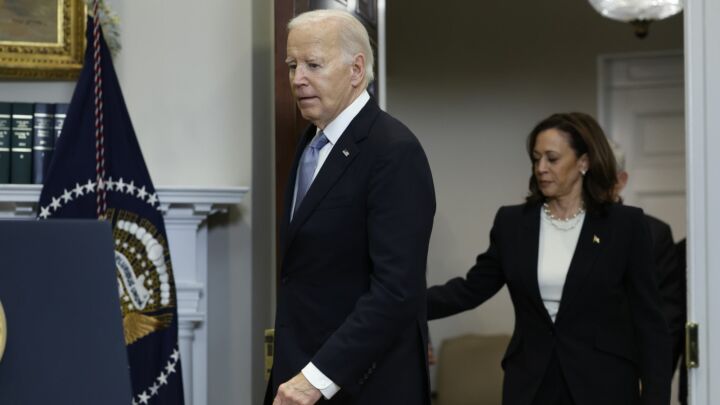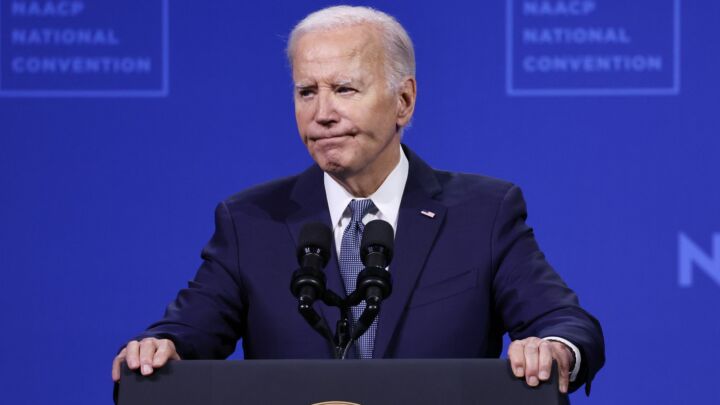Abortion is the biggest thorn in Trump’s side
Right-wingers are all in favour of freedom, until it comes to reproductive rights.

Want to read spiked ad-free? Become a spiked supporter.
Donald Trump, the US Republican presidential nominee, has given a statement clarifying his view on abortion. In an apparent attempt to rein in MAGA anti-choice zealots within his own movement, he said that he doesn’t support a federal ban on abortion, and that decisions on abortion rights should be left to individual states.
Pragmatism has likely played a large part in this statement. It has become increasingly clear over the past couple of years that a hardline anti-abortion stance is a vote-loser. Despite the rantings of extremists, normal Republican voters understand that birth control, including abortion, is now essential to modern life. After all, even those who disagree with abortion personally do not want to see women jailed for having one.
Trump’s decision to let individual states determine abortion policy could well be a sign of his commitment to states’ rights. Or it could be a way of avoiding taking a position on abortion one way or the other. ‘The law of the land, in this case, [is] the law of the state’, he said. ‘Many states will be different. Many will have a different number of weeks or some will have more conservative [limits] than others and that’s what they will be.’ Got it.
Trump’s record on abortion is all over the place. In 1999, he declared he was ‘very pro-choice’. Twelve years later, he was suddenly ‘pro-life’. In the past few years, he has been talking about the need for a compromise, condemning abortion bans at six weeks as ‘a terrible thing’. On Wednesday he even said that in his eyes, Arizona might have gone too far with a total ban on abortion. How long Trump’s current position will last could well depend upon how it lands with the media.
Trump’s current ‘let the people decide’ position could well anger both sides of the debate. His evangelical voters will accept nothing less than a total federal ban on abortion. On the other side, an overwhelming majority – 69 per cent of voters, according to a recent Gallup poll – want universal access to abortion in the first trimester. They won’t be happy with state-level restrictions on abortion.
There is no getting around the fact that abortion is a very sticky issue for American conservatives. Their defence of tradition and the family has often been tied to the value they place on unborn life. They see abortion as a symbol of anti-natality, a rejection of motherhood – an act undertaken by women Trump himself once described as ‘nasty’. As they see it, abortion is a threat to the family.
But this is a misconception. Women who have abortions are not anti-family. Nor are they generally women who do not want children. In the UK, where access to abortion is cost-free and liberally available, more than half of abortions are accessed by mothers. Many of them are seeking abortion because they believe having another child would threaten the stability of their existing family.
Indeed, the pro-life position – resting on the sanctity of life from conception onwards – often leads its advocates into anti-family positions. Take the decision from the Republican-dominated Alabama Supreme Court earlier this year. In February, the court, in an expression of pro-life zealotry, declared that frozen embryos must be treated as ‘children’. This caused all IVF procedures to be halted, given embryos are inevitably destroyed in the process of selecting which embryo has the greatest chance of survival. In doing so, the court effectively prevented infertile couples from having children. It is hard to imagine a more anti-family outcome than this.
It is notable that Trump has gone out of his way to praise the rapid reversal of the Alabama decision. He has even insisted that, as president, he will guarantee IVF access in every state to increase women’s ability to have children. But there’s a glaring inconsistency here: the embryos destroyed during the IVF process are often more advanced than those destroyed during early abortions.
Trump may well be trying to lead his supporters to a more liberal place on abortion. But he could well struggle to take his conservative backers with him. Too many on the activist right are blinkered on this issue. They are blind to the myriad contexts in which it takes place, and ignorant of the reasons why women decide to go through with it.
The conservative regimes that do manage abortion well are those that are able to treat abortion as a private matter. They accept that it is quite possible to value the life of the unborn and the decision-making capacity of a woman seeking an end to a pregnancy. They recognise that the decision to bring a pregnancy to an end ought to be a matter for the conscience of the woman involved. The state’s role in abortion should be limited to medical matters – to ensuring the procedure can be delivered effectively and safely.
If Republicans want to win at the polls they will need to find a way to reconcile the right to choose with their own conservative values. Trump’s team needs to understand that the personal right to abortion is not an identitarian, ‘woke’ concern. It is an expression of individual autonomy.
Roe v Wade held for nearly half a century because it situated abortion in the private domain – in that area of life that is free of state intervention, where we are at liberty to make decisions about our own families. The right to abortion doesn’t undermine the family. But denying it does. Banning abortion deprives women of their ability to plan their families.
How the abortion issue plays out in the upcoming election will tell us a lot about the maturity of American conservatism. If it wants to have a future, it needs to grow up.
Ann Furedi is author of The Moral Case for Abortion: A Defence of Reproductive Choice.
Picture by: Getty.
To enquire about republishing spiked’s content, a right to reply or to request a correction, please contact the managing editor, Viv Regan.








Comments
Want to join the conversation?
Only spiked supporters and patrons, who donate regularly to us, can comment on our articles.